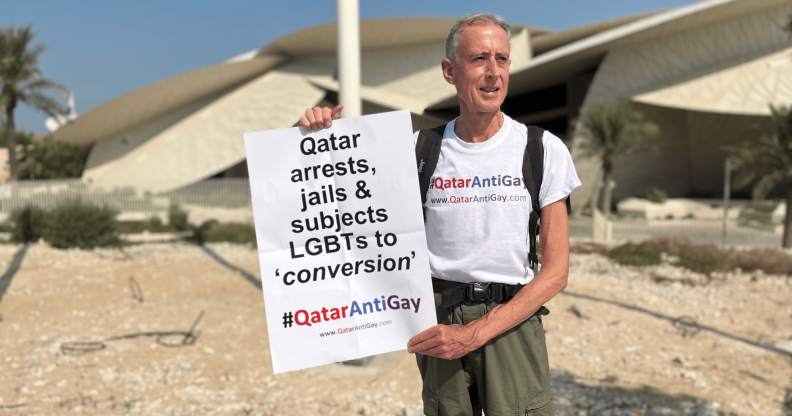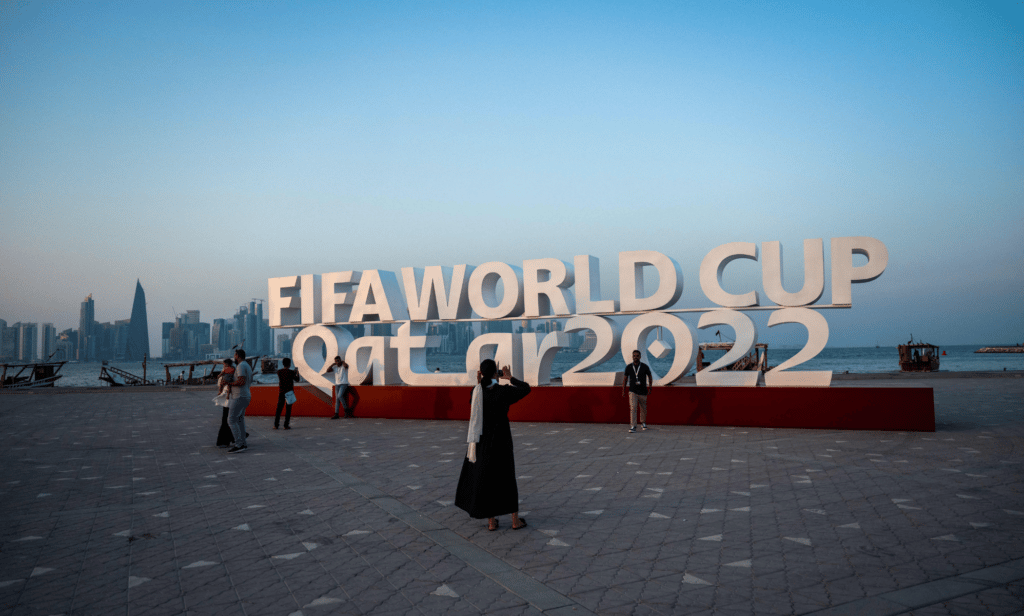LGBTQ+ activist Peter Tatchell says Qatar ‘deflecting from diabolical human rights abuses’

Peter Tatchell claimed he was detained by police and state security services for 49 minutes.(Peter Tatchell Foundation)
Activist Peter Tatchell said the Qatari government is attempting to “deflect from their diabolical human rights abuses” after officials denied he was arrested for protesting.
Peter Tatchell claimed he was “arrested” in Qatar on Tuesday (25 October) following a one-man demonstration against the country’s treatment of LGBTQ+ people, migrant workers and women ahead of the football World Cup.
Shortly afterwards, he said he had been “freed”.
However, Qatar officials told PinkNews that reports of an arrest were “completely false and without merit”.
“An individual standing in a traffic roundabout was cordially and professionally asked to move to the sidewalk, no arrests were made,” Qatar’s government communications office said.
I have been seized by #Qatar police after staging the first LGBT+ protest in the homophobic Gulf state.@FIFAcom awarded the #WorldCup to Qatar where LGBTs can be jailed & executed.#FreePeter #QatarAntiGay
Info: https://t.co/fEOHFINkVEhttps://t.co/LvKWFQjr5Q
— Peter Tatchell (@PeterTatchell) October 25, 2022
Peter Tatchell insists he was “held” for almost an hour.
“A colleague and I were held by police and state security services for 49 minutes,” he said.
“Photos and videos of the protest on a mobile phone were deleted by police and the detainees were not allowed to leave.”
He continued: “We were interrogated about our trip. Then we were told we must be on our onward flight to Sydney.
“It’s a shame the Qatari government is trying to deflect from their diabolical human rights abuses by misrepresenting a peaceful protestor.”
Tatchell is now in Australia.
Statement on Qatar's media response. @FT @washingtonpost @PinkNews @ChrisPJGodfrey @Reuters pic.twitter.com/B0vc70ydRg— Peter Tatchell (@PeterTatchell) October 25, 2022
In a video interview with Doha News, Tatchell said he was “arrested, but not removed” from the site of the protest, and was “released without charge”.
“I was very, very nervous,” he said. “I feared possibly being detained, and perhaps even physically abused, but the officers did none of that.”
Tatchell’s protest has garnered widespread media coverage. While some have criticised his methods, others have thanked him for highlighting the issue.
What @PeterTatchell has done takes huge courage.
His arrest in Qatar only proves his point. A brutal regime that persecutes LGBTQ people should not have been allowed to host the World Cup.
Solidarity, Peter. I hope you’re home safe soon.— Nadia Whittome MP (@NadiaWhittomeMP) October 25, 2022
Jayne Ozanne, an LGBTQ+ campaigner and founder of Ban Conversion Therapy, described Tatchell as a “seasoned, brave campaigner” in an interview with GB News.
She said Tatchell would know “he was one of the lucky ones”.
“He was released without any physical damage after 49 minutes, but others are not so lucky,” Ozanne explained.
“They can spend years in jail and even sadly face the death penalty, and that’s why we need to be so concerned about Qatar’s human rights record – particularly with regards to LGBT people but also with regard to migrant workers and to women.”
Founder of UK's Ban Conversion Therapy Coalition, Jayne Ozanne, discusses the Qatar government hitting back at claims Peter Tatchell was arrested while protesting against the country’s treatment of LGBT people in the run-up to the World Cup. pic.twitter.com/C5lrnJLlN9— GB News (@GBNEWS) October 26, 2022
Qatar World Cup highlights human rights abuses
Human rights in Qatar have come into sharp focus in the build-up to the World Cup, which kicks off in November.
Homosexuality is illegal in Qatar and punishable with fines, years in prison and, in some cases, death. There are no legal protections for queer people from discrimination in the Gulf state.
Human Rights Watch said authorities in Qatar have arbitrarily arrested and abused LGBTQ+ people in the country as recently as last month.
A Qatari official said the report contained “information that is categorically and unequivocally false” without specifying exactly what was not true.

Campaigners and LGBTQ+ football fans have raised concerns about the safety of queer people – both residents and visitors – in Qatar ahead of the World Cup. (Getty)
Sacha Deshmukh, Amnesty International UK’s chief executive, told PinkNews that “attempts to silence” Peter Tatchell for “drawing attention to Qatar’s outrageous criminalisation of LGBTQ+ people is a stark reminder of the repressive climate around freedom of expression in the country”.
“We recently heard remarks from 2022 World Cup CEO Nasser Al Khater about how Qatar would guarantee the safety of LGBTQ+ fans at the tournament, but the fact the Qatari authorities are even issuing ‘reassurances’ like this weeks before kick-off shows how much fear and trepidation there still is on this issue,” Deshmukh said.
“It’s an outrage that consensual same-sex acts in Qatar are illegal and can lead to a jail sentence.”
Deshmukh said the human rights organisation will continue to call on Qatari authorities to repeal the country’s “appalling” anti-LGBTQ+ laws and ensure that all queer people – residents or visitors – have their rights “fully protected, both now and after the World Cup”.
Amnesty International has tirelessly been calling on a FIFA-backed compensation fund for migrant workers who suffered in order to make the World Cup happen in Qatar.

